Trump's special elections record boosted by Bishop's win in North Carolina. Other times he won and lost
WASHINGTON – As the nation began to turn its attention to the midterm elections last year, President Donald Trump was eager to drive home a point about the power of his coattails.
In a series of tweets, Trump boasted that Republicans had won many high-profile special elections for Congress. He framed the point as an undercut to the collective wisdom that his sagging poll numbers had become a drag on GOP candidates across the country.
"The Republicans are 5-0 in recent Congressional races, a point which the Fake News Media continuously fails to mention," Trump wrote, overlooking the Democratic win in an Alabama special election for Senate. "I backed and campaigned for all of the winners."
Since then, Trump's record has been shakier. But Tuesday's dramatic special election in North Carolina's 9th congressional district – in which Republican Dan Bishop defeated Democrat Dan McCready – underscored the benefit of presidential engagement in a contest that will be heavily scrutinized for signs of the president's own strength as he begins to campaign for reelection next year.
Trump touched down in the district for a raucous rally Monday to support Bishop as polls had indicated a tight race. That alone was telling since Trump bested Democrat Hillary Clinton in the 9th congressional district, which stretches from Fayetteville to just outside Charlotte, by nearly 12 points in 2016.
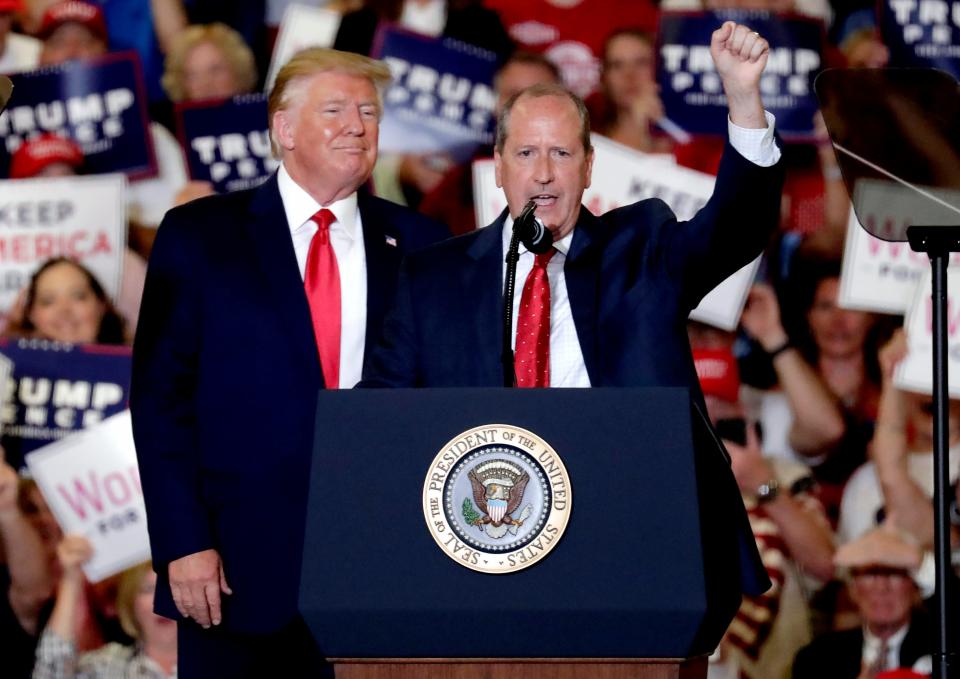
Trump quickly took credit for the Republican win Tuesday.
"Dan Bishop was down 17 points 3 weeks ago," Trump tweeted. "He then asked me for help, we changed his strategy together, and he ran a great race."
Special elections, with notoriously low turnout, are not indicative of the country's overall mood. Still, Bishop's win buys Trump and the GOP breathing room and allows the president to tout his support in a closely watched suburban contest.
Poll: Warren’s latest hurdle: Democrats' belief women face tougher fight against Trump
Of the 20 special elections during Trump's presidency, Democrats held or flipped eight and Republicans held onto 12 seats. Those numbers are deceiving because, in many cases, the contests were lopsided for one party or the other regardless of Trump's influence.
Here's a look at other high-profile special elections where Trump had a stake:
Troy Balderson
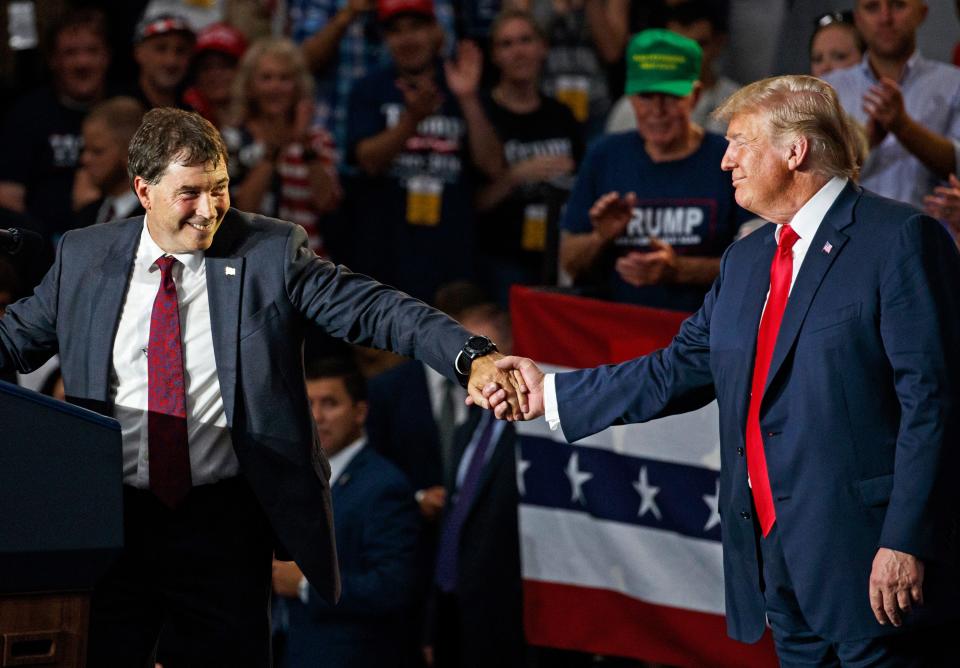
The Ohio special election last year to pick a replacement for Republican Rep. Pat Tiberi was a mixed blessing for the GOP. Republicans kept the district – voters backed Rep. Troy Balderson for the seat – but analysts framed the race as a warning for the White House.
That’s because Trump won Ohio’s 12th congressional district by 11 points in 2016. In less than two years, the Columbus-area district went from a relatively safe bet for the GOP to exceedingly competitive territory in an important presidential state.
Balderson beat Democrat Danny O’Connor by less than a point.
Trump held a rally three days before the election, predicting a “red wave” in the midterm elections. Democrats would ultimately claim the House in that election while Republicans kept the Senate.
Trump on 9/11: While paying tribute to 9/11 victims, Trump blasts Taliban as Afghanistan peace talks falter
Trump subsequently boasted that his support for Balderson made the difference.
“After my speech on Saturday night,” he tweeted at the time, “there was a big turn for the better.”
Doug Jones

Sen. Doug Jones scored a shocking upset in the Alabama special Senate election in 2017, capturing a seat for Democrats in one of the nation's reddest states.
Trump backed Republican Roy Moore despite allegations that he had molested or pursued relationships with teenage girls in the 1970s. The president initially kept his distance from Moore, but then endorsed him.
"We don’t want to have a liberal Democrat in Alabama, believe me," Trump told reporters at the White House days before the election on Dec. 12, 2017.
Jones won with a margin of less than 2 points.
Cindy Hyde-Smith
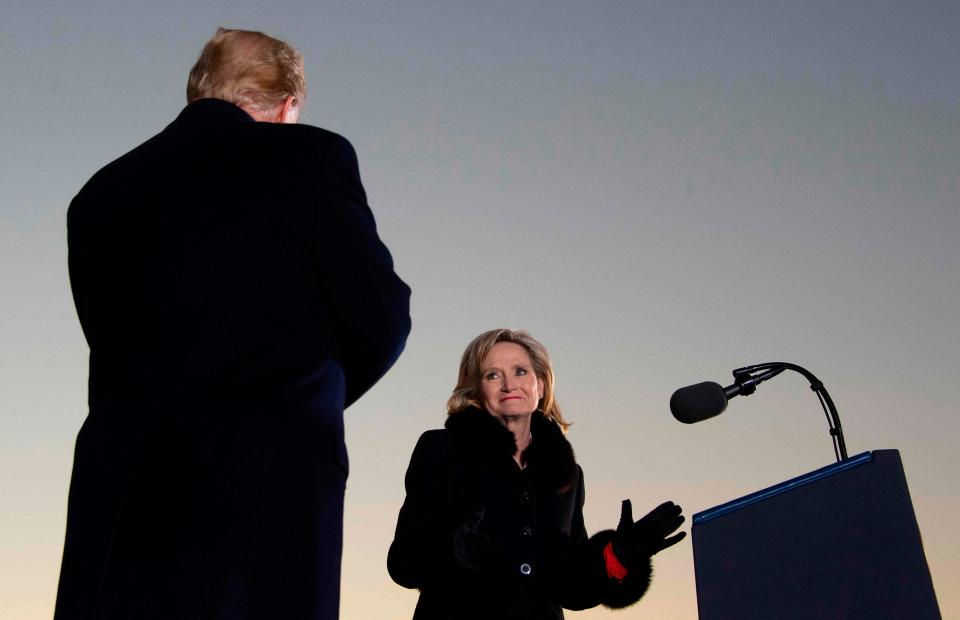
Republican Sen. Cindy Hyde-Smith held on to her Mississippi Senate seat in a runoff last fall against Democrat Mike Espy despite backlash over comments she made about a "public hanging." Hyde-Smith was appointed to the seat months earlier when Sen. Thad Cochran, also Republican, retired over health concerns.
Trump defended Hyde-Smith after the fallout over her remarks, in which she said she’d be glad to attend a 'public hanging" for a friend. Her opponent, Espy, a former member of Congress and agriculture secretary for President Bill Clinton, is African-American.
Trump, Congress and guns: GOP leaders meet with Trump as pressure mounts on gun legislation
Trump held rallies in Tupelo and Biloxi on her behalf, telling supporters that a vote for Espy would be a vote for Senate Minority Leader Chuck Schumer and House Speaker Nancy Pelosi.
Polls are open in Mississippi. We need Cindy Hyde-Smith in Washington. GO OUT AND VOTE. Thanks!
— Donald J. Trump (@realDonaldTrump) November 27, 2018
Trump carried the firmly Republican state by 18 points in 2016 and the state hasn't elected a Democratic senator since 1982. But Democrats thought Espy’s hard-fought campaign could draw black voters to the polls, much like the firmly red state of Alabama, where a massive African-American turnout helped Jones in his surprise upset over Moore. More than a third of Mississippi’s electorate is African-American.
But Espy’s efforts fell short and Hyde-Smith was able to secure a victory despite the controversy surrounding her remarks.
Tina Smith
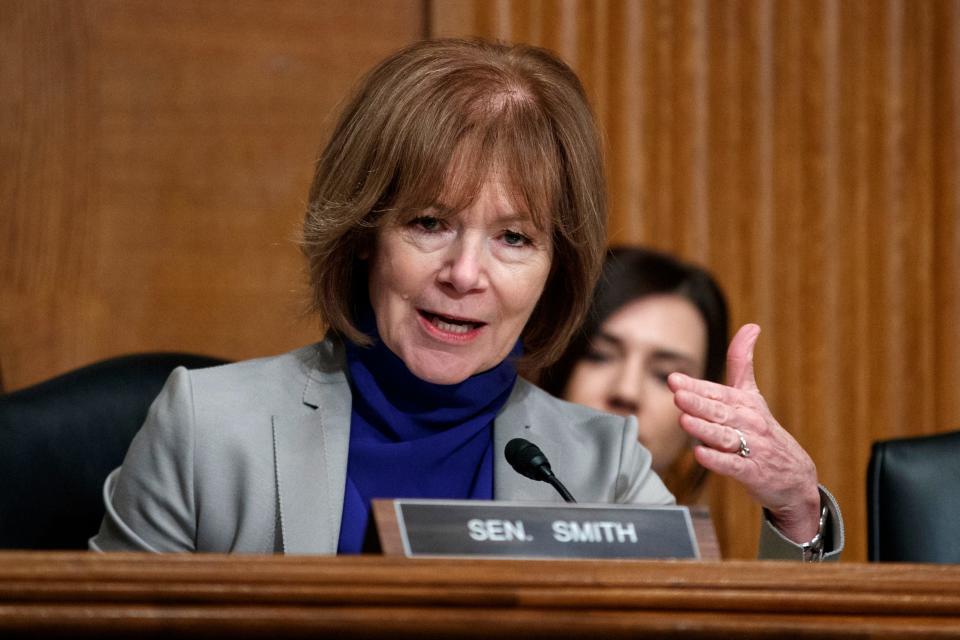
Sen. Tina Smith, D-Minn., staved off a Republican challenger in the 2018 special election to replace former Sen. Al Franken, who resigned amid allegations of sexual misconduct in 2017. Smith, who served as lieutenant governor of Minnesota, was appointed by the governor to replace Franken after he stepped down.
She faced off against Republican Karin Housely, a state senator who sought a boost from Trump at one of his rallies in Rochester a month before the November elections.
“Get Karin Housley into the Senate. We need her. We need her vote,” Trump told a crowd of supporters on Oct 4, 2018.
Elizabeth Warren: Elizabeth Warren’s latest hurdle to the presidency: Democrats' belief women face tougher fight against Trump
Trump likened a vote for Housely to "a vote to respect our borders, respect our Constitution, and to love and respect the heroes of law enforcement."
Though Minnesota tends to lean Democratic, some thought Housely might pull off an upset victory after Democratic presidential nominee Hillary Clinton only narrowly defeated Trump 46.4% to 44.9% in 2016.
Conor Lamb
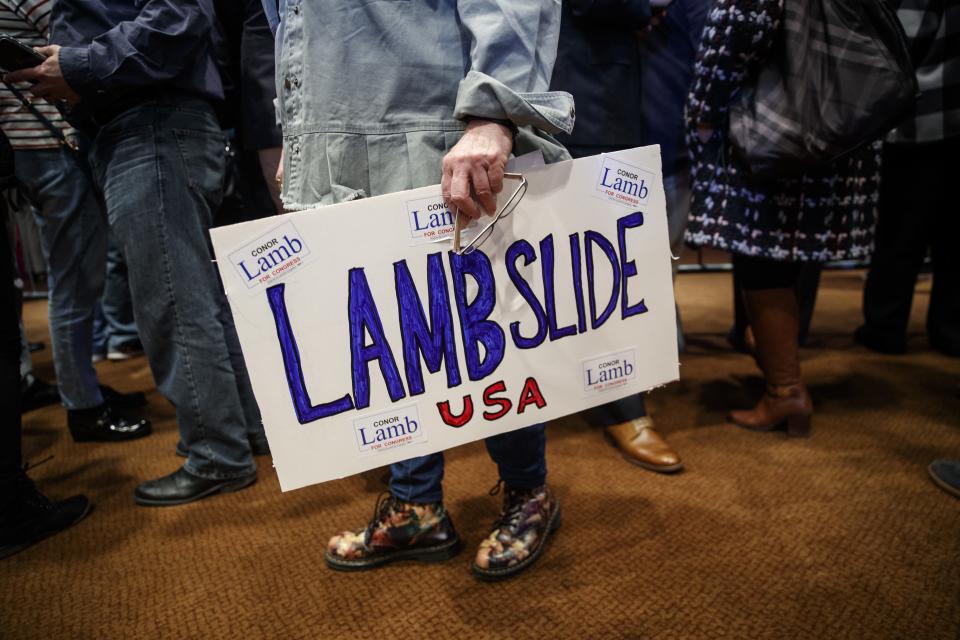
In a razor-thin race last spring, Democratic Rep. Conor Lamb won the special election in Pennsylvania’s 18th congressional district outside of Pittsburgh. Trump had carried the district by 20 points in 2016 and the GOP candidate, Rick Saccone, had embraced the president’s support.
Days before the March 13 election, Trump swung into the district to campaign for Saccone, predicting that he would be a “great, great congressman.”
Republicans were saddled by an incumbent who resigned amid a personal controversy: Former Rep. Tim Murphy resigned after reports that he asked a woman with whom he was having an affair to have an abortion. Still, the outcome of the race – in a key presidential suburban district, no less -- was widely viewed as a loss for Trump.
The race drew attention from high profile Democrats as well: Former Vice President Joe Biden, now seeking the Democratic nomination for president, held a rally for Lamb days before Trump’s appearance in the state.
Karen Handel
The closely watched 2017 special election in Georgia’s 6th Congressional District saw Republican Karen Handel, a former Georgia secretary of state, defeat Democrat Jon Ossoff, a 30-year-old former political aide and filmmaker who launched a longshot campaign that attracted national attention.
The closely contested election to replace former Rep. Tom Price, R-Ga., whom Trump appointed as Health and Human Services secretary, was one of the costliest House races ever.
Ilhan Omar: Son of 9/11 victim addresses Ilhan Omar during memorial: 'Show respect in honoring them, please'
Though Handel won the traditionally Republican suburban district, Democrats saw Ossoff’s national rise as a chance to prove Trump’s unpopularity ahead of the election. Though Trump never attended a rally for Handel, he offered his support on Twitter, urging Georgia voters to back the Republican.
The Dems want to stop tax cuts, good healthcare and Border Security.Their ObamaCare is dead with 100% increases in P's. Vote now for Karen H
— Donald J. Trump (@realDonaldTrump) June 19, 2017
Handel narrowly lost in the midterm election in 2018 to Democrat and gun control activist Lucy McBath. She plans to run in 2020 to reclaim her seat.
Ossoff announced Monday he plans to run to replace retiring Sen Johnny Isakson, whose departure will trigger a special election in November.
This article originally appeared on USA TODAY: Donald Trump: Dan Bishop win boosts president's special election record

